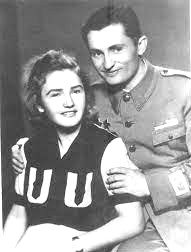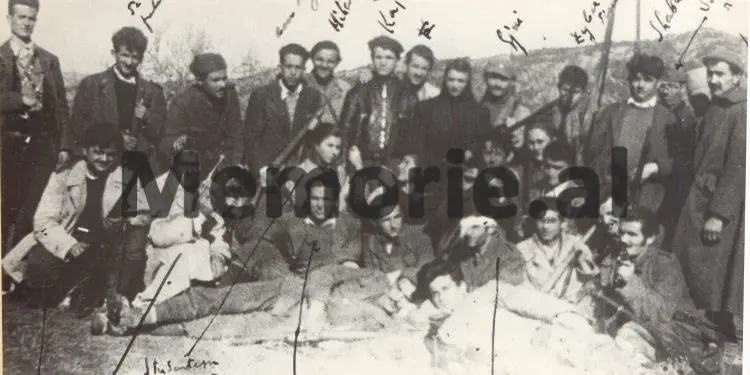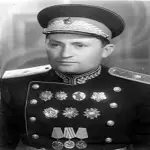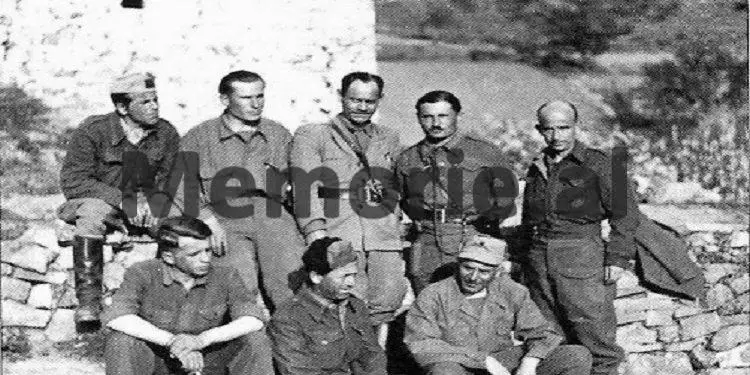By Ermira Isufaj
Memorie.al / General Gjin Mark’s daughter tells the story of her life. His father’s close friendship with Enver Hoxha, why the latter never gave him the promised post of Minister of Defense, the “ultimate” letter, which expelled his father from the ranks of the Communist Party and its Central Committee, 30 years of ordeal of family persecution. Svjetllana shows the pain experienced by the death of her father, in the prison hospital, the severe mental illness of her Yugoslav mother, and the difficulties of a life with very little “breathing” in it.
After two years of living in a tent in the middle of the capital, where the sun and the rain penetrated equally through the green cloth, that 50 square meter apartment, on the second floor of an old building, had almost nothing else but space. Everything turned upside down, clothes thrown on the floor that smelled of mold and old furniture, were what was paid for through a loan taken from the bank, which was covered by the salary of the little sister.
If it wasn’t for the presence of Svetlana Marku, I might not have believed my eyes, when the body of an old woman appeared in front of me, frozen to the size of a handful of bones, while the catheter tube next to her body was the living testimony of the aging of the 90-year-old woman, once a beautiful Yugoslav partisan named Natalia, who stole the heart of General Gjin Mark.
If her life was not filled with so much suffering, surely the traces of age would not be so degrading. Svetlana Marku’s mother, moreover, you had lost your sight and hearing…! That whole situation hit me in the face, so much so that after a moment of shock, I realized that everything was a consequence of the past life. The general’s daughter, in fact, turns around to find the thread of the story…!
Ms. Svetllana, you are the daughter of Gjin Mark, one of the most prominent military personalities during the years of the dictatorship. At the same time, your father was one of the trusted friends and closest to the leader of the time, Enver Hoxha, right?
My father has a long military career to be admired. He came from a patriotic Mirdi family, but since my grandfather was killed with a bullet in the forehead, my father was orphaned at a very young age. It ends at the “Vorfnore Shelter” in Tirana. And, after seven years of schooling, he gets the right to study in high school, in the branch of Agriculture, in complete opposition to his father’s military interest.
However, this school was worth it years later, when he was appointed farm director in the village of Llakatund in Vlora. After the cycle of studies, he was assigned to the position of agricultural agent in the city of Korça.
In this period, he smelled the organization of the first anti-fascist movements in this city and the creation of the first detachments and important communist partisan brigades. As a young man, full of desires and dreams, he starts the so-called movement of young communist shoots, and at this time he meets Enver Hoxha, in a chance meeting at the house of Koço Tashko (head of the Communist Group of Korça). Enveri noticed my father’s temperament and will and a close friendship was quickly born between them.
My father was one of the main names of the creative structures of the Communist Party, among the signatories of the creation of the Party on November 8, 1941. At the same time, he won the position as a member of the Central Committee of the Communist Party. In December of the same year, my father was appointed to the task of raising partisan detachments for the liberation of the homeland, this by special order of the leader Enver Hoxha.
He started with the Korça detachments, those of Skrapar and many others, having a busy activity as a devout anti-fascist. In all this situation of successes, in May 1944, he was expelled from the Central Committee of the Communist Party, due to disagreements with Enver Hoxha.
How did the exclusion happen?
Through an ultimatum letter, Comrade “Taras” wrote to him that he should appear in Helma i Skrapar, at a meeting of the Central Committee and where he warned him that he should not be late even a day and that his absence would not be forgiven. Everything was planned in such a way that the true purpose of the meeting would not be understood, at the end of which, Gjin Marku would be expelled from the structures of the Central Committee.
But what really “mined” their relationship?
During the activity of the war and the Communist Party, the main leader wrote several letters to me, with various claims. The first crack in the relationship between the two would be determined at the moment when Enver Hoxha would write his first claim, for the lack of reports from my father, against him.
Reports on the progress of the war, on the condition of the partisans, on armaments, etc. The second crisis, but the one that would finally seal the relationship between them, was the “famous Berat conspiracy”, described as such by Hoxha.
After the departure of the Italian fascist forces, Hitler’s forces teach in Berat. In the duels between them, my father in the direction of the Albanian detachments, ascertaining the weakening of our forces, in the face of the superiority of the German ones, sees as necessary the implementation of a military tactic, which consisted of a 12-day ceasefire, until the situation with food, weapons and clothing.
The “Commander”, (Enveri), could not handle this situation, and immediately sent him a letter, with harsh doses of criticism in it. After that, the father asks that he pass as a simple partisan and without military leadership duties.
In return, he receives the answer that a pious soldier with aspirations like him cannot waver or give up easily, in the face of any pressure or criticism. “You shouldn’t lose faith in yourself, because every mistake is human,” wrote Enveri in another letter to Tim Eti. After the anti-fascist war, the father was assigned to study at the “Voroshilov” military school in Moscow, like many other cadres of the time. He stayed there for a while with Mehmet Shehu, who also studied at the same military academy.
What happened next?
In the years 1946-1948, my father studied in Moscow, simultaneously gaining the position of the first Albanian military attached. But, a special order of Enver Hoxha, forces him to interrupt his studies, to be present at the First Congress of the Communist Party, where, according to rumors, the name of General Gjin Mark was rumored to be appointed to the position of the Minister of Defense. When he returns from Moscow, my father finds an incredible terror in Albania. Near mint condition.
Koçi Xoxe was arrested, while the prisons were full, deportations were carried out en masse. He is shocked when he learns that the partisan commander Mestan Ujaniku, from Skrapari, with whom he had collaborated, was found with a cut vein, dead in prison. All this pressure affected him badly, and in his speech at the congress, the father openly opposes the violence and political pressures that people were suffering on the skin. He somehow went against the party line and the orders of Enver Hoxha, but courageously defending the people, or ordinary communists.
The meeting is interrupted and at the next meeting, he is asked to do self-criticism. And he, in order to protect his family, his wife and two children, accepted, but immediately after the congress, he was appointed director of the Air Defense sector of the Army, to finish in 1961, farm director, in Llakatund of Vlora.
These years of anxiety were certainly not experienced so well by your mother, Natalia Viriovic, were they?
My mother was a very beautiful Yugoslav. They met their father in 1944, when the Albanian anti-fascist forces, after liberating many cities of the country, went outside the borders, mainly in Montenegro, Bosnia-Herzegovina and Kosovo, to continue their fight in pursuit of the German occupation forces. They met in Vuçitern, Kosovo; my father was 25 years old, while my mother was 20. She was a very sympathetic partisan. They fell in love at first sight, that’s what they both said.
But the difficulties that my father faced were many, and many times my mother ended up hospitalized in a psychiatric hospital. The new life in the unknown village of Vlora was exhausting, and the mother experienced it very badly, until she ended up in the hospital. For the father, it was not an unknown profession, as he had studied agriculture in high school, and was able to take the Llakatund farm from the third category to the first. After two years of staying in Llakatund, at the beginning of 1963, he was called to a special meeting, where General Nevzat Haznedari, vice president of the Vlora Department of Internal Affairs, arrested his father.
On what charge was he arrested?
The allegation raised by the Interior Department was an attempt to escape, after my father had gone for three days in a row to another village in Vlora, to inspect farms and agricultural products there.
How old were you at the time and how do you remember that event?
At that time, I was only 13 years old…! That day, many forces of the Security, unknown people, led by General Nevzat, who raided our house, turned everything upside down, to make a mess in documents, or in various papers, that the father could possess. I remember the screams and the psychological terror he inflicted on my mother, just released from the psychiatric hospital. I cried loudly and with the naivety of a child, I asked them not to hurt us, because I was going to write a letter to uncle Enver.
While, after that time, I met my father behind the bars of the prison, first in the prison of Zvrnec. All our meetings were held in the presence of major officers. They checked us from head to toe and that’s how our suffering began. After Llakatund, we lived for a year in the village of Ndrnënas in Fier. We were isolated and in extremely difficult living conditions. There were nights when we went to sleep with empty stomachs and unwashed.
When we saw that we had no escape, I wrote a letter to Mehmet Shehu, where he explained that due to the lack of a high school in the village where we were, we could move as a family, somewhere else, even to Burrel, to my grandparents. But the answer we got in return was silence…!
During this time, did you keep in touch with your father?
It was very difficult to meet him. However, the father, after learning about our family’s deportation, organizes a hunger strike in the Tirana prison, as a sign of protest for the deportation of the family. This caused us to be brought from the village of Ndrnennas to the city of Fier, and as a sign of revenge, they arrested our brother, Aleksandr, on charges of “agitation and propaganda”.
Because he had met by chance on the street, with a former schoolmate, who had been expelled, because he was the son of a gangster. This mistake was enough for the brother to be sentenced to five years of imprisonment, which he served in Spaçi and Burrel prisons.
Ms. Svetllana, how was your life in this internment camp?
We stayed for 28 years in a row in Fier. With the beginning of the new life, the mother suffers a second depression and is hospitalized again. It seems to me that that small town, the controlled and isolated life, without any real livelihood opportunities, took a heavy toll on the mother spiritually and psychologically. After the improvement of her health, she was appointed a Russian language teacher in the city’s high school, while I started high school, which I was not allowed to finish, or to get my diploma, because I was the daughter of an “Enemy of the People”, everything was conspired so well.
This happened after I was called to his office by Muço Salihu, the brother-in-law of Adil Çarçani, head of the Branch in Fier, who wants to recruit me as an associate of the Security, and to admit that my father was an “enemy of the people”. I didn’t accept something like that, and they put tremendous pressure on me, even secretly meeting the sick mother, to “steal” some company. It was a very difficult life. My sister started working on a farm near where we lived, and so did I. Our life became more and more difficult, while mother’s health condition worsened.
What was happening with your father in the meantime?
My father was inhumanely tortured in prison. These tortures, as well as being separated forever from his family, shortened his life. The last time I met him was just two hours before his death. If only my heart would stop that day…! I ask for permission at the Internal Branch of Fier, to meet my father in Tirana, and early in the morning, I appear at the appeal.
I take the train and then the bus and I find myself next to my father, a few hours before his death. He had been suffering from cirrhosis of the liver for some time. It was as solid as a handful of bones, piled up on the bed. As soon as he saw me, he let out a last gasp, and his eyes went white…! I can’t forget those moments; I was shaking and drowning in tears. At the age of 65, my father said “goodbye” to life, forever.
What is left of your life today, although the conditions you live in do not need many words?
My life has always been full of suffering. Due to almost 30 years in exile and the need to be close to my mentally ill mother, I remained unmarried. My brother escaped in a dinghy, in an unknown direction, I have lost contact with him for over 20 years. My old mother was very ill and I had to take care of her at all times.
I have not even a single consolation in my life. Just when I thought that finally a ray of light had come into my life, I started working in the Complaints Office at the Ministry of Defense, during the Safet Zhulali period, where I worked with dedication for two years, but it was such a short experience. Life often feels like hell…! Memorie.al
















